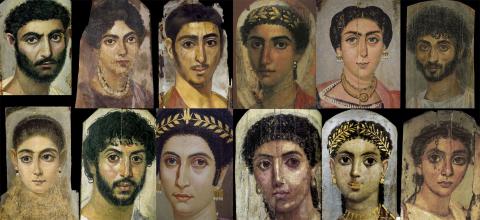Arum Park
August 13, 2018
Princeton University’s Department of Classics has launched a new pre-doctoral fellowship for promising young Classicists who would contribute to the diversity of the University. Premised on a recognition that access to Classics is not equitable, the fellowship provides both preparation for and admission to Princeton’s Ph.D. program. I reached out to Professors Michael Flower and Dan-el Padilla Peralta to learn more about the concerns and conversations that gave birth to this fellowship. Below is our exchange, lightly edited for clarity.
Park: This fellowship is, as far as I know, unique. From what I can gather, it essentially offers financial support for post-baccalaureate study along with admission to Princeton’s Ph.D. program upon completion of the post-bacc. It seems to me unusual to fund a post-bacc—can you tell me how the idea for this level of support came about? Were there other fellowships that inspired Princeton’s?
Flower and Padilla Peralta: This is a new initiative and, as far as we know, there is nothing else like it. We wanted to create something that is substantially different from a post-bacc and that is why we came up with the name “pre-doctoral.” The substantive differences are that it is fully funded and includes an offer of regular admission for the following year. The recipient does not need to reapply for regular admission, and that is important. We want to show that we are committed to these students in the long term and that they do not have to “prove themselves” once they get here. Right from the start they will be regular members of our academic community and not “second class” members in any respect. What the Pre-doctoral Fellowship gives them is an extra year of support in which to fully prepare themselves for the regular program, especially in terms of language preparation.
Do you intend to offer this fellowship every year?
The initiative will be run initially as a three-year pilot; it is our hope to continue well past that window once we secure the funding required to place the fellowship on a firm long-term footing.
What is the ultimate goal of this fellowship? Is it to diversify Classics faculty over time? In what ways do you think an increasingly diverse faculty might affect the field of Classics?
Yes, the long-term goal is to diversify the field of Classics (broadly defined). The future of the field really does depend on training more faculty members from diverse backgrounds and on embracing a broader constituency of students. To state the obvious, too often Classics has been seen (not unreasonably) as an elitist subject, one that is beyond the horizon of expectations of most students either as a career goal or as a subject to study in College. Whatever one can do to rectify this situation is worth an investment of both time and money.
Do you anticipate or hope that Princeton’s fellowship will become a model for peer institutions?
In the best of all possible worlds this fellowship could serve as a model, and not just for Classics departments. It is heartening to see other new initiatives that are animated by broadly similar convictions about the need for diversity and inclusion (such as the University of Michigan’s Bridge MA).
I imagine that the fellowship must have been born from some thoughtful conversations about diversity and inclusivity. When did Princeton’s Classics department start having these conversations? Does Princeton Classics engage in other diversity efforts?
Over the past three years our department has attempted to affirm a more robust dedication to diversity and inclusion, not only with words but with deeds. This past spring, several projects began to bear fruit. In March Dan-el co-organized “Racing the Classics” with Sasha-Mae Eccleston of Brown University. Generously supported by the Princeton Humanities Council, this conference inaugurated the first of what will be a series of disciplinary and transdisciplinary engagements with the place of race and ethnicity in the construction of knowledge. In April our graduate students hosted the conference “Women in Classics, Women on Classics.” And in May our department’s faculty and staff participated in a day-long training facilitated by Race Forward: The Center for Racial Justice Innovation.
Within the context of graduate admissions in particular, we have tried to diversify our applicant pool by identifying and recruiting students from underrepresented backgrounds (both ethnically and economically), but such students can be hard to locate using the conventional tools for outreach. In consultation with our Deans for Diversity and Inclusion, we came up with the idea of a fellowship that would simultaneously reach out to more potential applicants and demonstrate a real commitment to their future.
That is, we are ready to dedicate our time, money, and resources to giving a chance to the type of student who would otherwise never apply to Princeton or who has had little or no access to components of the traditional preparation for graduate study in Classics. To turn again to the automatic offer of regular admission—students from underprivileged backgrounds should not have to keep proving themselves over and over again. If they did well in their BA and their mentors have faith in their ability to continue their studies at a higher level, that should be enough.
We recognize that the enterprise of diversifying Classics does not and cannot stop here. Our thinking about the aims of the fellowship has evolved in conjunction with conversations about how to promote a climate of meaningful inclusion and racial equity here at Princeton. One outcome of these conversations has been a more capacious vision of what needs to be done to make our department and our discipline truly invested in the knowledge and experiences that students and faculty from historically underrepresented groups bring with them. The fellowship is one component of that vision.
To learn more about the fellowship, please visit the Princeton Classics Announcement [Here]. Those interested may also want to read about the SCS's Minority Scholarship in Classics and Classical Archaeology, and the new Onassis Distinguished Diversity Scholarship for Graduate Study Fund at the University of Michigan's Department of Classical Studies.
Header Image: A composite of Roman era Fayum portraits from the Getty Museum, the Metropolitan Museum of Art, and Wikimedia.
Authors


